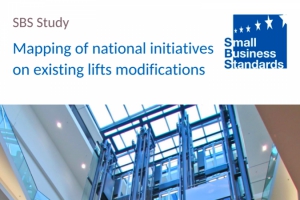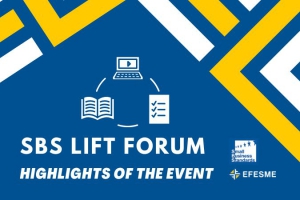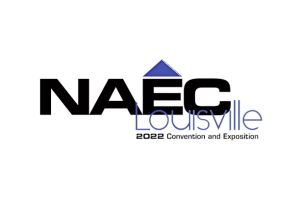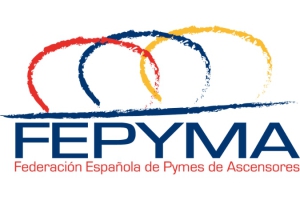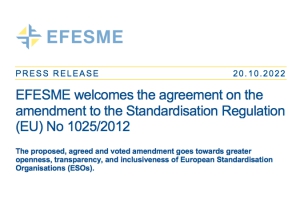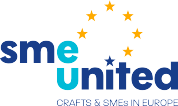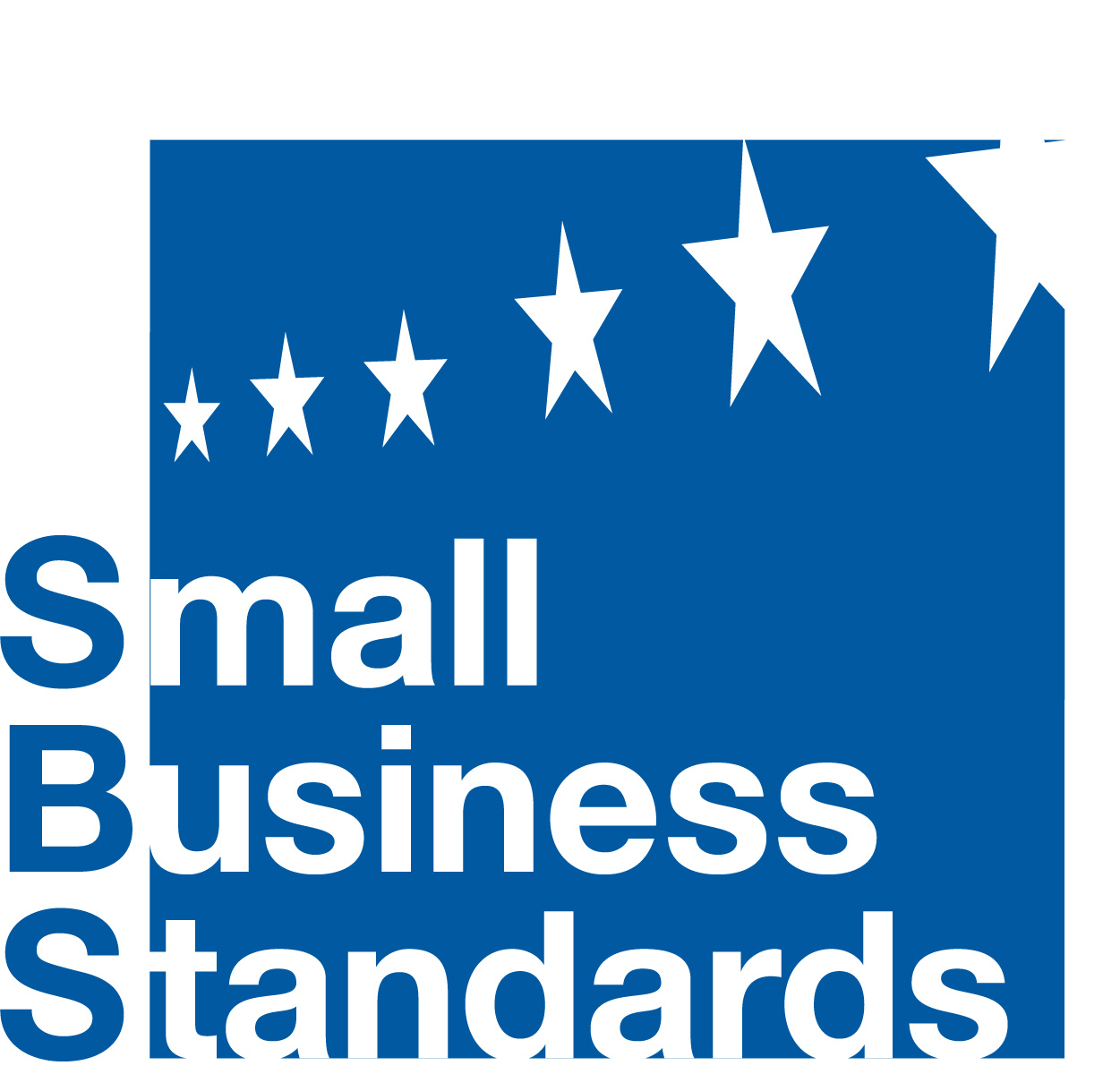
The core business of most lift SMEs is in maintenance, repair and modernisation services. To complete this study, a survey has been launched in 2022 among the EFESME members to gather information on what practices exist on lifts modifications at national level.
In some member countries the national standardisation bodies have developed local good practices that define the requirements for carrying out repair and modernisation works on installations "in a workmanlike manner".
The experts involved have mapped and compared these common practices to asses if there is a need for common European guidelines to support the execution of the most complex interventions on existing installations, or whether the situation, although handled differently at national level, has reached its balance ©SBS - Small Business Standards
There are no European standards dedicated to maintenance, repair and modernisation services in the lift industry.
In this context, SBS - Small Business Standards and EFESME decided to developa study to better understand the situation at national levelregarding the several approaches to this type of intervention on existing lifts, and see which are the national practices and rules to perform such interventions.
The inputs collected by the survey shared with the EFESME members showed very different situations at the national level. In some states there are national practices, often very different, in others not. This already identifies a non-homogenous situation with regard to these important works, which are often the daily work of European lift SMEs.
On this basis, the technical experts involved carried out a detailed analysis in order to create a comprehensive overview of whether there is a need for some kind of European guideline for this type of maintenance, repair and modernisation work - and, if so, what kind of document should be developed to support the correct and safe execution of these major interventions.
The results of this survey are now available to the public in aSME-friendly final report with tables summarising the information received from the national level.
This SBS Study is part of the activities developed by SBS - Small Business Standards and EFESME to support European lift SMEs in standardisation, to inform and train them, and provide them with information useful for their daily work and knowledge.
Engineering Review 12/2022 - Elevator Industry Expo ‘ISEE 2022’ was a resounding success
From December 1st to Decmeber 3rd, EFESME and its President, Massimo Bezzi, attended this year's edition of ISEE - International Sourcing Expo for Elevators & Escalators in Mumbai, India.
There, President Bezzi had the occasion to speak not only about the Federation and its activities, but also about the importance to provide the correct support to list small and medium-sized enterprises in the development of their potential as the main actors in the installation and maitenance market, which rappresent an imporant share of the Europea Lift SMEs that EFESME represents.
In the words of Engineering Review, India's Leading Industrail B2B Magazine:
President Masimo Bezzi, President of the European Federation for Elevator Small and Medium-sized Enterprises (EFESME) said: “I believe it is important for us to be present here as we strongly believe and support fairs like ISEE which in turn are promoting and supporting small and medium sized companies investing in the quality and development of the products and improving the knowledge of installer and maintenance companies. I am glad ISEE has proven to be an excellent exhibition and forum for the various parties to meet and discuss”.
- Read the whole Engineering Review article HERE
SBS Lift Forum 2022 ~ Highlights

On November 23, the 2022 edition of the SBS Lift Forum took place online. This year, EFESME and SBS - Small Business Standards dedicated the SBS Lift Forum to special tools and instructions for use, a topic of the outmost importance for the entire industry, and to the crucial role played by harmonised standards in making them accessible and available at the installation site.
Special tools and instructions for use, and their constant presence and availability at the site of a lift installation, are of fundamental importance for the work of European lift SMEs, especially those involved in maintenance. In this context, European standards play a key role in facilitating such access and availability “in time and space”, and in supporting the creation and implementation of an increasingly SME-friendly working environment, mainly through the action of their technical experts within the European standardisation and working groups that matter most, with the continuous support of SBS.
During the event, the European Commission and the technical experts involved had the opportunity to address this crucial topic for European lift SMEs from different perspectives, in order to give the public a complete and well-rounded perspective.
The event opened with introductory speeches by the President of EFESME, Mr. Massimo Bezzi, and the Secretary General of SBS - Small Business Standards, Mrs. Maitane Olabarria Uzquiano. Emphasising two different but interconnected points of view, that of the European lift SMEs on the one hand and European standardisation on the other, Mr. Bezzi and Mrs. Olabarria Uzquiano reminded the audience that special tools and instructions for use are not a new topic for the sector, quite the contrary. EFESME and SBS have been working together on these topics over the years, aware that this is a crucial topic for the daily work of the small and medium-sized enterprises that, jointly, the two associations represent in Europe.
Both emphasised that the availability of special tools and instructions should be ensured on the installation site, to properly allow easier and safe maintenance operations and to support the implementation of a true level-playing field in the industry.
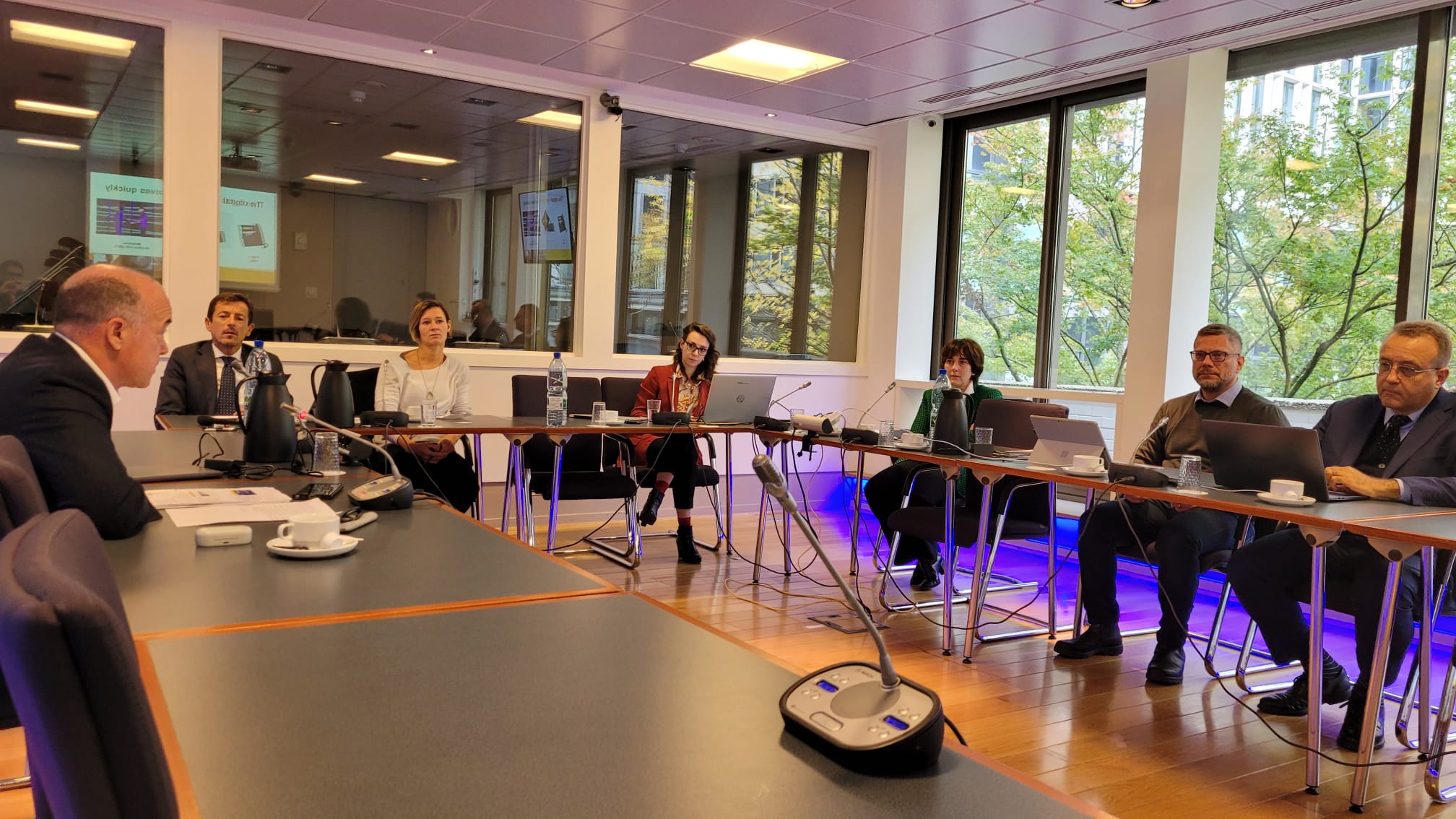
From left to right: Mr. Patrick Cox - Tree; EFESME President Massimo Bezzi; Dr. Frauke Hoss - EU Commission; EFESME Advisor Elettra Bilibio;
SBS Secretary General Maitane Olabarria Uzquiano; Mr. Ivan Ferrarini - Farma; and Mr. Paolo Tattoli - UNI.
Entering into the more technical part of the event, the first panel was a sort of second introduction to the topic, but reaching towards modernity and the future. Where the opening speeches highlighted and summarised the steady importance of special tools and instructions for use, and the activities carried out so far in this regard with the various stakeholders, this first panel revolved around the role that digitalisation is playing and will increasingly play in the future on this subject.
Mr. Patrick Cox, CEO of the Tree Consortium in Italy, drew from his day-to-day experience, and emphasised the importance of digitalisation as a formidable tool to enable SMEs to harness the creativity that characterises them and is one of their strengths.
Mr. Cox outlined three key points for digitalisation to best utilise its potential for the benefit of SMEs and their activities towards a faster, more attractive and customer-friendly system:
- Support technological development within lift SMEs with investments that enable them to develop better services based on the proactivity and predictability of their interventions, with benefits for both the SME itself and the customer;
- Create a new type of relationship with the users, so that they in turn understand the importance of the digital approach and the benefits for them as well;
- Train technical experts and provide them with a working environment where they can work at their best.
In this context, the role of standardisation to make special tools and instructions for use available has enormous potential to create a level-playing field within which all stakeholders involved can move in the same way and with the same opportunities. According to Mr. Cox, following these three points will lead SMEs to transform their business in an increasingly digital way, to be true market players supported by appropriate harmonised standards that are tailored to them.
Presentation: The importance of standards and special tools, and the role of digitalisation
The second panel, to go into the details of the topic from different points of view, opened with the intervention of Dr. Frauke Hoss, Policy Officer of the European Commission - DG GROW H.2, the team dedicated to Machinery & Equipment and working on the lift sector.
Dr. Hoss explained to those present that the standards, and the references to special tools and instructions for use within them, do exist, but that there are also problems in their implementation that need to be resolved.
This was an extremely important consideration, especially since the instructions for use should be part of the standards, and the standards themselves are currently being revised to bring them up to date with the latest market developments.
In the same spirit of revision, there should be more clarity as to which requirements are covered by the standards, and how they are duly applied once they are updated. This is an ever-evolving regulatory framework, which ties in with the ongoing and future revisions of the Machinery Directive (update on EHSRs due to technological innovations), the Cyber Resilience Act (cybersecurity for digital products), and the Lift Directive (operation in emergencies).
The presence of the European Commission and its Officers at these events is crucial for SMEs, as it allows them to have a forum for direct discussion with one of the most important stakeholders involved in the development not only of standards, but also of working conditions themselves at European level.
Following Dr. Hoss, Mr. Paolo Tattoli, Chairman of the UNI Lift Committee CT019, presented the results of a survey he has started to carry out among the notified bodies in Italy, which he hopes to expand soon by contacting the other EFESME members. The subject of this research was, precisely, the availability of special tools and instructions for use, going into the specifics of what is actually present at the installation site.
Based on four questions distributed to different engineers throughout Italy, the research reported very different results, demonstrating that there is no common approach due also to the lack of clear and verifiable prescriptions in the lift safety standards.
In his conclusion, Mr. Tattoli once again stressed the lack of special tools and instructions for use on site, and once again underlined the potential that standards can have to better define this important circumstance, a leitmotif present throughout the event.
Presentation: A survey of what is present at the site of the lift
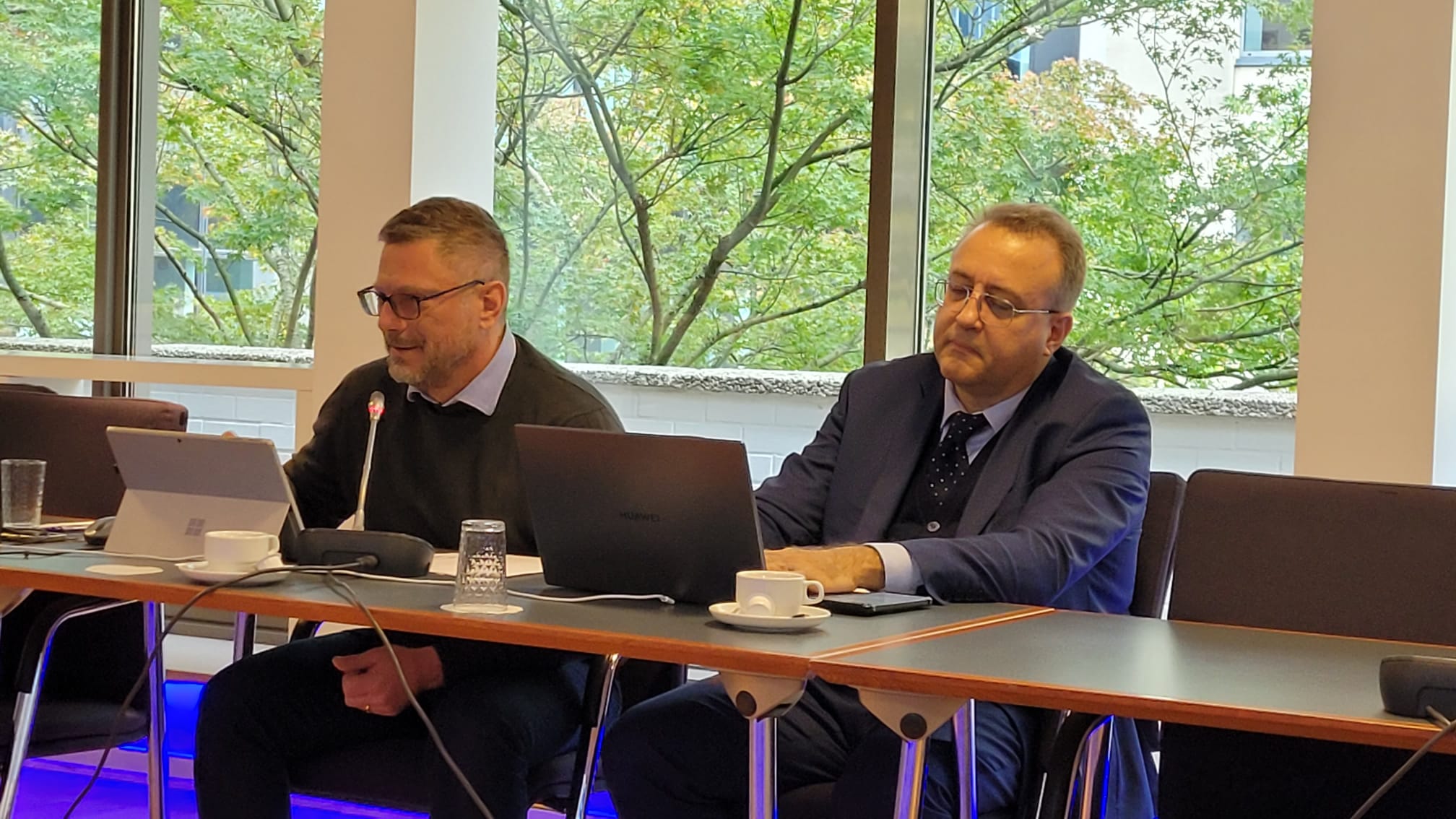
Mr. Ivan Ferrarini - Farma and Mr. Paolo Tattoli - UNI
Finally, Mr. Ivan Ferrarini, head of the technical department of an Italian SME and SBS expert within CEN TC 10 WG 1 and TF HaS, gave an overview of the evolution in recent years of the presence of special tools and instructions within the most important standards for the sector and within the Lift Directive. This comprehensive overview made it possible to demonstrate in detail how this issue is not new, but rather has been a topic of discussion and debate for many years among the many stakeholders involved, going back to what was initially introduced during the opening speeches.
Mr. Ferrarini also presented some proposals for the future, in order to continue to support and encourage the presence of the special tools and instructions for use at the installation - an encouragement of great importance, coming from a SME stakeholder with valuable experience based on everyday work.
Presentation: EC and CEN timeline about «Special tools» and «Instructions»
MORE INFO - Ask us the interactive PPT!
WATCH THE RECORDING HERE!
The event was an important opportunity to discuss an issue that is very much felt by SMEs and which impacts their daily business in a significant way. Bringing together the various stakeholders, discussing together the position of SMEs, and coming up with proposals for the future, are all fundamental steps towards greater accessibility and availability of special tools and instructions for use, supported by harmonised standards that also provide clarity and transparency on this aspect of the sector, and towards an increasingly SME-friendly working environment.
EFESME wishes to thank SBS for their cooperation in organising the Forum, the speakers for their interesting and useful presentations to better understand this crucial topic, and the audience for their participation.
We look forward to seeing you next year with more events and initiatives to bring European lift SMEs ever closer to the world of standardisation and make them more active players!

EFESME newsletter #4/2022
EFESME attends the National Association of Elevator Contractors (NAEC) Expo & Convention
This year, the annual National Association of Elevator Contractors (NAEC) Expo & Convention took place in Louisville, Kentucky, between the 18th and the 21st September.
At the kind invitation of the NAEC Team and of its General Manager, Mr. John Tolar, EFESME took part in the meeting in the person of its President, Mr. Massimo Bezzi. The Expo & Convention was another important opportunity to talk about lift SMEs in Europe, their work and potential, and the many activities that EFESME, as the European Federation representing them, is carrying out in the technical-political sphere to support them in the best possible way.
President Bezzi's speech was on Tuesday 20th, during the panel "Presentation on the Quarterly Global Industry Survey/InterLIFT", dedicated to the most recent news and updates from the lift industry, especially in Europe.
On his part, the President gave an overview of several topics from the lift SMEs point of view, such as:
✅ The role of EFESME as the voice of lift SMEs in Europe, and its lobbying activities with the European institutions to support SMEs in the sector, and to promote the creation of a working and regulatory, as well as educational, environment that enables them to realise their full potential;
✅ The technical activities of the EFESME experts both in the field of standardisation and in policy-making;
✅ The activities developed with our partners, such as SBS - Small Business Standards and SMEunited, both from a technical and regulatory point of view, and from a political point of view, so that the demands and positions of SMEs can be represented by strong stakeholders at the work tables that matter;
✅ The most recent development in European and international standardisation in the lift sector, and how the interconnection between several standards reality has the potential to create a market and en environment in which European lift SMEs can thrive and show fully their creativity and potential.
➡️ Find President Bezzi's presentation HERE
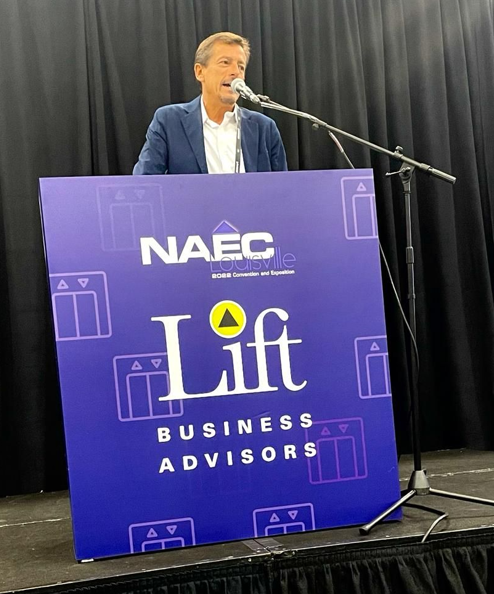
(EFESME President, Mr. Massimo Bezzi, during his speech at the Expo & Convention)
The National Association of Elevator Contractors, year after years, conference after conference, has proven itsefl to be another great and essential occasion to meet the stakeholders in the lift industry, and discuss the importane of small businesses.
The American market, although different from the European one in many respects, nevertheless expresses some common instances with its overseas counterpart, which can find their meeting point thanks to standards - another point dear to EFESME and emphasised by its President, namely how a convergence, finally global, of standards and their contents, has enormous potential for European lift SMEs. To do this, the standards and the environment that will be created must essentially be tailored to and for the benefit of SMEs, a mission that is the cornerstone of all the activities of the Federation, its members, its experts, and its closest partners in Europe.
EFESME thanks NAEC and its staff for the opportunity and the interesting conference, in the belief that such a participation of the Federation may become, in the coming years, an opportunity to be repeated, in order to strengthen collaboration and exchange of ideas and information.
NAEC's 2022 Convention & Exposition
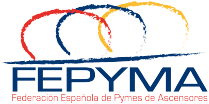
For the second time this year, FEPYMA, the Spanish member of EFESME, is organising an event to discuss with Spanish lift SMEs how to remove barriers, of all kinds, to create a working and living environment that allows them to thrive and use at the very best their capabilities.
In FEPYMA own words,
"Removing physical barriers is what the lift industry is doing across Europe to achieve universal accessibility and mobility in all buildings.
SMEs are a key player in the lift industry and a part of local economies. Although they are leaders in the accessibility of existing buildings, they face legal and regulatory barriers, as well as commercial and technological barriers."
It therefore becomes clear that the removal of barriers - addressed here in a multifaceted manner, recognising their different nature and the different problems they bring - is not only desirable but even necessary to enable European lift SMEs to make the most of their potential, and to increasingly become participating and indispensable players in the European lift industry.
This is an issue that is very close to EFESME's heart, part of its very mission from the beginning. Over the years, the Federation has worked with his experts and members, as well with the lift SMEs it represents, to recognise, raise awareness of, and break down these barriers, be they technical, linguistic, architectural, and so on.
For this reason, along Mr. José María Compagni Morales, coordinator of FEPYMA and one of EFESME Vice-Presidents, the Federation will be present and the event with its European partner, SBS – Small Business Standards. Together, the two associations will talk about how standardisation is playing its fundamental part in removing these barriers, and how the European reality may be the right environment to develop standards and policies that go in this direction and support lift SMEs.
It will be an interesting approach, which will bring together the European multi-sectoral approach of SBS and the EFESME lift targeted and focused approach , demonstrating how they can work together to strengthen each other and achieve the best results for SMEs.
Many other guests will be present, so that the evnt will become a great round-table to be able to address this important topic from several points of view; Internet of Things, digitalisation, and accessibility for SMEs will be other crucial topics to discuss together, to see where other barriers are present to impede SMEs to fully develop their potential.
Find more information on the FEPYMA event here [in Spanish]
EFESME welcomes the agreement on the amendment to the Standardisation Regulation (EU) No 1025/2012
The proposed, agreed and voted amendment goes towards greater openness, transparency, and inclusiveness of European Standardisation Organisations (ESOs).
The agreement reached by the Council of the European Union and the European Parliament on 12th October, and approved during the Coreper I meeting on 20th October, endorses the proposal of the European Commission to amend the Standardisation Regulation.
The amendment foresees that the national standardisation bodies from the EU and the European Economic Area (EEA) will be the actors taking key decisions in the standards-development process after a mandate from the Commission. This will ensure the protection and respect of EU values, and the direct involvement of SMEs and their associations in providing expertise to ESOs to make their administration and governance more open, transparent, and inclusive.
Moreover, the newly created Recital 4(a), on the need to guarantee the “essential” SMEs interests are represented within the ESOs and at national level, is warmly welcomed. This Recital, adding to the EC proposal, underlines once more the need for transparency and inclusiveness in the standardisation system, involving SMEs and all interested stakeholders.
EFESME welcomes this agreement, especially regarding the EU values, and the direct involvement of SMEs and their associations in providing expertise to ESOs towards a greater openness, transparency, and inclusiveness.
